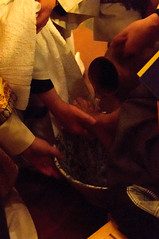 My parish did something different with the foot washing ceremony last Holy Thursday. Instead of the priest washing the feet of twelve parishioners (often twelve men), everyone in the congregation had their feet washed and washed others’ feet. You sat down at the basin and had your feet washed. Then you put your socks and shoes on, knelt down, and washed the feet of the next person in line.
My parish did something different with the foot washing ceremony last Holy Thursday. Instead of the priest washing the feet of twelve parishioners (often twelve men), everyone in the congregation had their feet washed and washed others’ feet. You sat down at the basin and had your feet washed. Then you put your socks and shoes on, knelt down, and washed the feet of the next person in line.
The ritual proceeded quietly and reverently. It took a while. Standing in line I was anxious, worried about how my feet would look, glad I had clean socks on, concerned to do the deed properly when my turn came. It wasn’t the incredulity the apostles felt when Jesus insisted that he wash their feet, but it was perhaps a small taste of it. It didn’t feel right. Not dignified. Not the kind of thing that’s supposed to happen in church.
But that’s the point, isn’t it? The service we’re to render others doesn’t feel good most of the time. Jesus knew that, and so he made a dramatic gesture of humble service—a dirty, disagreeable service that slaves did. He rebuked their objections. And then he said to them, “go and do likewise.” John’s is the most eucharistic of the four gospels, but he doesn’t mention the Eucharist in his long account of the last supper. The washing of feet is the centerpiece of the story.
Ignatius believed that there isn’t much difference between our deepest desires for ourselves and God’s desires for us. Most of the work of the Spiritual Exercises is an effort to answer the question: What do I really want? When we know that, we know what God wants. One sure sign of authentic, God-given desire is desire that is directed toward others rather than ourselves. I knew this as an idea, in an abstract way. But when I washed the feet of a stranger on Holy Thursday, I knew it in a concrete way, in a deeper place.
Image by photoverulam under Creative Commons license.
